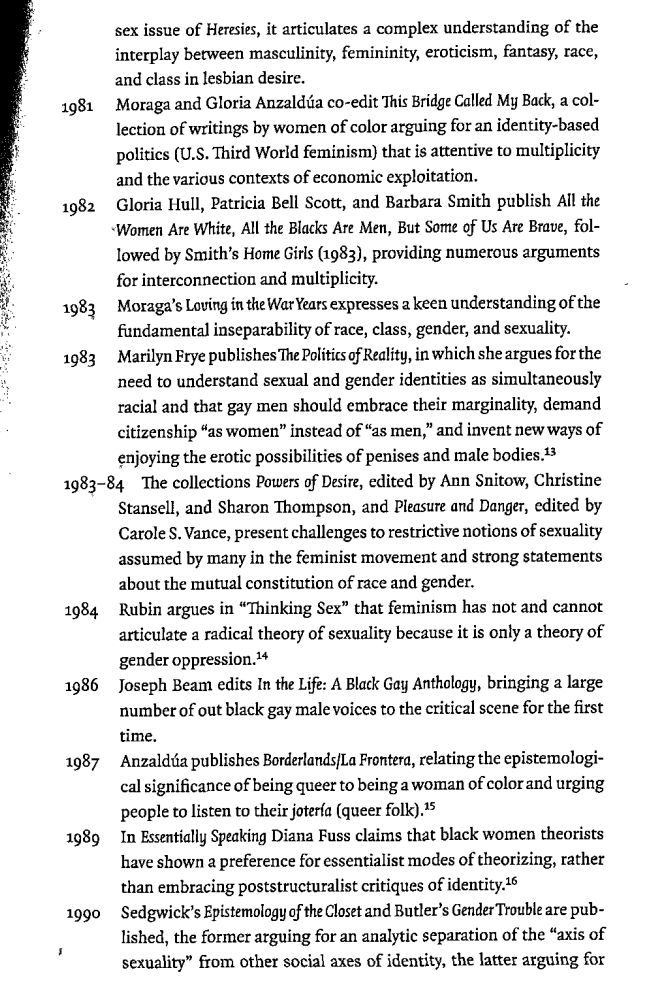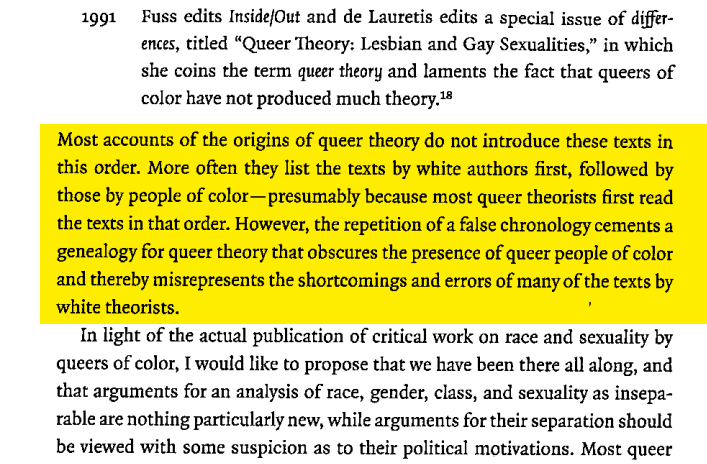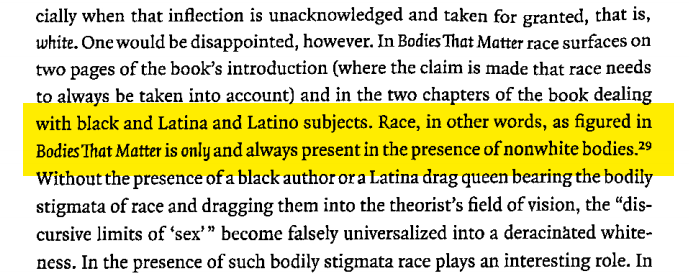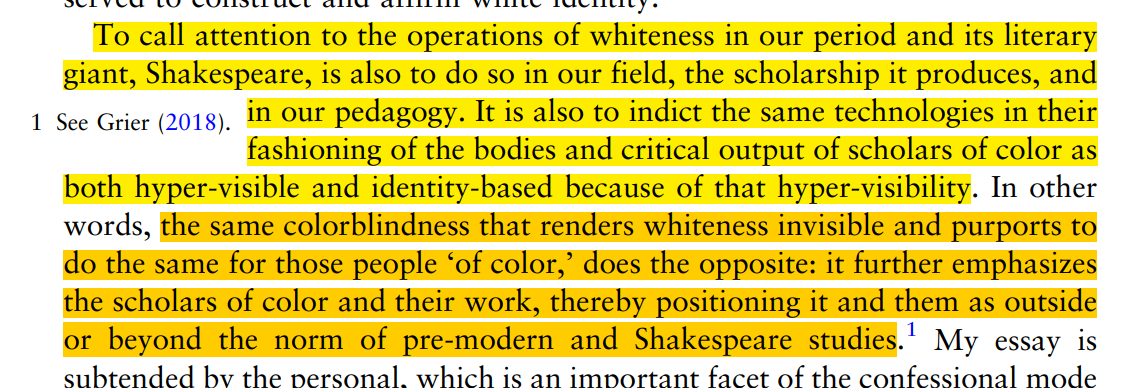Erik Wade ( @erik_kaars) again! Last big thread for me as this week& #39;s host. Hopefully also a little less big than the other threads (sorrrrry, I am wordy).
I want to conclude by acknowledging an article that& #39;s shaped my thinking about scholarly genealogy. #MedievalTwitter
I want to conclude by acknowledging an article that& #39;s shaped my thinking about scholarly genealogy. #MedievalTwitter
My training in grad school was in both medieval studies and queer theory, and my approach to medieval studies has been profoundly influenced by queer theory. My threads over the last few days have their roots in an essay by Michael Hames-García in the Gay Latino Studies reader.
The essay is called "Queer Theory Revisited," and I cannot overemphasize how much it shifted my thinking about queer theory, race in the academy, and academic genealogy.
Basically, Hames-García argues that we are taught queer theory out of order so as to centralize whiteness.
Basically, Hames-García argues that we are taught queer theory out of order so as to centralize whiteness.
Most queer theory courses/histories of the field/anthologies *start* with white theorists: Foucault, Butler, Sedgwick, Warner, etc. Then they feature theorists of color, often in a section on "race", and frame their work as a "critique" of queer theory (represented by white ppl).
Hames-García points out *THAT& #39;S NOT TRUE.* Scholars of color theorized sexuality (in tandem with race and gender) for decades before these white theorists did.
If you read their contributions in chronological order, you see that scholars of color are not "just critiquing"
If you read their contributions in chronological order, you see that scholars of color are not "just critiquing"
Hames-García presents a chronological list of major works studying queer sexuality. Presented in order, Foucault appears a little after writers like Audre Lorde, while Butler/Sedgwick/Warner appear after decades of major work by scholars of color like Anzaldúa, Moraga, & Smith.
This list, and Hames-García& #39;s article, were profoundly influential to me. I first read it in a Queer Migrations course by his co-editor, Ernesto Martínez, and I modeled my own queer theory quals list on it. Reading queer theory in order, white theorists arrive belatedly.
Teaching them out of order, as Hames-García notes, centralizes white theorists as the queer canon, & makes queer of color critique seem additive, as if they "add" race to queer theory, when white authors actually entered an ongoing conversation & *chose* not to consider race.
As this list of pre-modern critical race studies makes clear, something very similar has happened in medieval scholarship on race, where white scholars arrive late and then primarily cite and center other white scholars and recent work. https://medium.com/@mrambaranolm/race-101-for-early-medieval-studies-selected-readings-77be815f8d0f">https://medium.com/@mrambara...
Hames-García& #39;s critiques of queer theory continue to resonate for me when reading recent "critical" white medieval work. He points out the reduction of scholars of color to footnotes in white academics& #39; work, a pattern apparent over and over in medieval work.
He points out how all of these strategies represent scholars of color as marginal to fields they& #39;ve contributed to for decades. He shows how Butler, for instance, only invokes race in discussions of POC, contributing to an image of whiteness as unmarked and universal.
In a wonderful new piece, @DrDadabhoy talks about how the refusal to name Shakespeare& #39;s whiteness pushes early modern scholars of color to the margins. The refusal to name whiteness at work in the field helps marginalize scholars of color.
https://link.springer.com/article/10.1057/s41280-020-00169-6">https://link.springer.com/article/1...
https://link.springer.com/article/10.1057/s41280-020-00169-6">https://link.springer.com/article/1...
We need to recognize and acknowledge whiteness. We need to recognize the erased scholars of color in our fields, and the ones excluded from our fields. I& #39;ve talked a bit about this in pre-modern critical race studies: https://twitter.com/Tweetistorian/status/1298966789712424963">https://twitter.com/Tweetisto...
Reducing scholarship and activism by scholars of color to "critique" centralizes whiteness and white scholars as "productive" and as "moving the field forward."
White scholars put scholarship by POC in footnotes. They rarely quote it. I have been guilty of this too.
White scholars put scholarship by POC in footnotes. They rarely quote it. I have been guilty of this too.
Many white medievalists now working on race mostly cite other white ppl& #39;s *forthcoming* work on race or in collections edited by white ppl. These things frame field-changing work as "forthcoming." But that work has *been written* by scholars of color.
It& #39;s just being ignored.
It& #39;s just being ignored.
As @DrDadabhoy points out here, what I am describing is Columbusing. I impressively managed to Columbus Columbusing, lolsob. Thanks for the reminder! https://twitter.com/DrDadabhoy/status/1299774942997745665?s=20">https://twitter.com/DrDadabho...

 Read on Twitter
Read on Twitter









